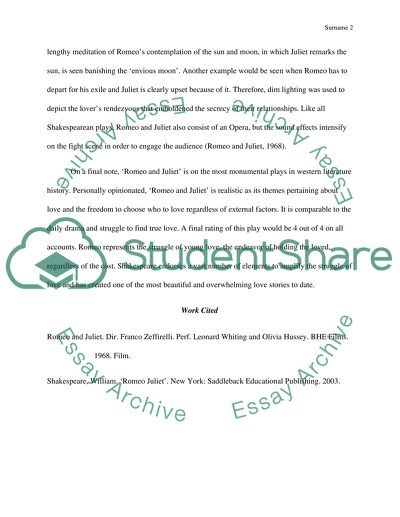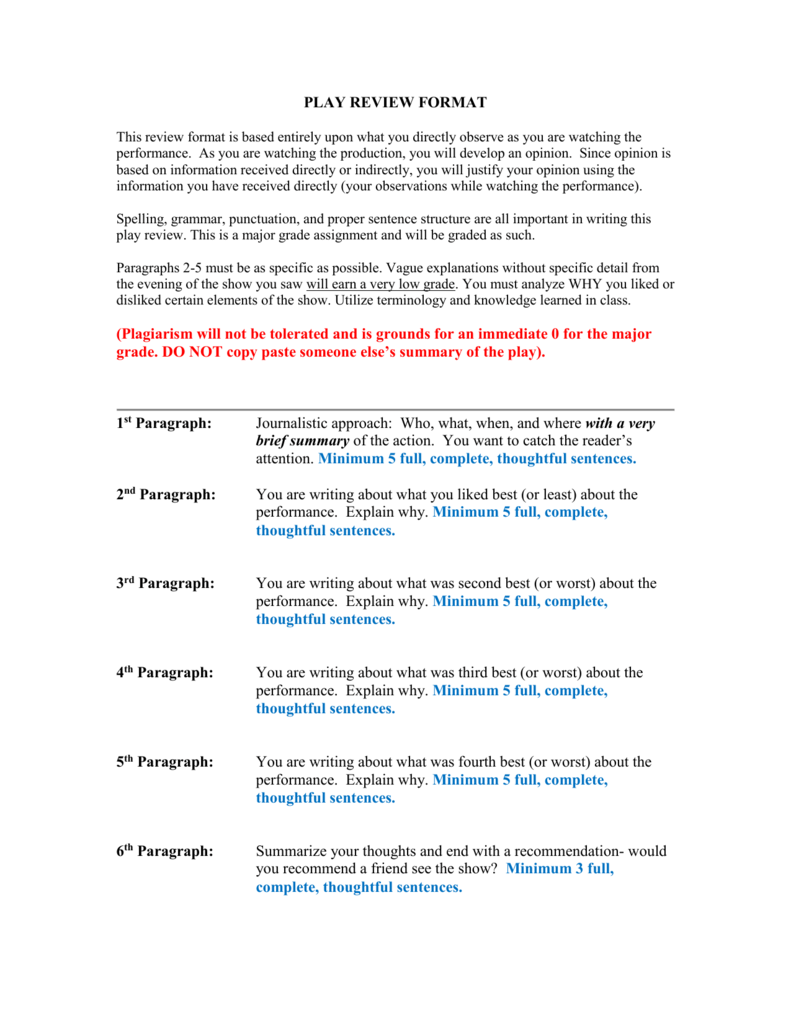
Mar 04, · To write a play review, start by taking notes during the show and writing a rough draft right afterward to capture your strongest thoughts and impressions. Craft a strong opening sentence that makes a bold statement about the play, and follow it with a paragraph on the who, what, where, and when of the play. Then, describe the play’s setting, characters, and plot before writing about the You have a half-finished essay, but you still need proofreading and expert critique to strengthen your writing. Our editor will help improve your style and will provide a detailed review of the essay structure, content, and tone critique of metaphysics, the critique of the concepts of being and truth, for which were substituted the concepts of play, interpretation, and sign (sign without truth present); the Freudian critique or self-presence, that is, the critique of consciousness, subject, of self-identity
Discourse on the Arts and Sciences - Wikipedia
A Discourse on the Moral Effects of the Arts and Sciencesalso known as Discourse on the Sciences and Arts French: Discours sur les sciences et les arts and commonly referred to as The First Discourseis an essay by Play critique essay philosopher Jean-Jacques Rousseau which argued that the arts and sciences corrupt human morality.
It was Rousseau's first successful published philosophical work, and it was the first expression of his influential views about nature vs.
society, to which he would dedicate the rest of his intellectual life, play critique essay. This work is considered one of his most important works. Rousseau wrote Discourse in response to play critique essay advertisement that appeared in a issue of Mercure de Francein which the Academy of Dijon set a prize for an essay responding to the question: "Has the restoration of the sciences and arts contributed to the purification of morals?
Rousseau went on to win first prize in the contest and—in an otherwise mundane career as composer and playwright, among other things—he had newfound fame as a philosopher. Scholar Jeff J. Black points out that Rousseau is one of the first thinkers within the modern democratic tradition to question the political commitment to scientific progress found in most modern societies especially liberal democracies and examined the costs of such policies, play critique essay.
an attack whose principles he never disavowed, and whose particulars he repeated, to some extent, in each of his play critique essay writings. Rousseau's account about his play critique essay encounter with the question has become well known. Rousseau's friend Denis Diderot had been imprisoned at Vincennes for writing a work questioning the idea of a providential God.
As he walked to the prison to visit him, Rousseau was perusing a copy of the Mercury of Franceand when his eyes fell upon the question posed by the Academy of Dijon, he felt a sudden and overwhelming inspiration "that man is naturally good, and that it is from these institutions alone that men become wicked".
Rousseau was able to retain only some of the thoughts, the "crowd of truths", that flowed from that idea—these eventually found their way into his Discourses and his novel Emile. In his work Rousseau, Judge of Jean-JacquesRousseau used a fictional Frenchman as a literary device to lay out his intent in the Discourse on the Arts and Sciences and his other systematic works, play critique essay.
The character explains that Rousseau was showing the "great principle that nature made man happy and good, but that society depraves him and makes him miserable vice and error, foreign to his constitution, enter it from outside and insensibly change him.
Throughout he makes us see the human race as better, wiser, and happier in its primitive constitution; blind, miserable, and wicked to the degree that it moves away from it. His goal is to rectify the error of our judgements in order to delay the progress of our vices, and to show us that where we seek glory and renown, we in fact find only error and miseries".
An example of one of "those metaphysical subtleties" that Rousseau may have been referring to was the consideration of materialism or Epicureanism. Scholar Victor Play critique essay, examining Rousseau's Letter to Voltairenotes: "Although he returns to the problem of materialism throughout his life, Rousseau does not ever discuss it at any length.
He chooses to write from the perspective of the ordinary course of things, and philosophical play critique essay breaks with the ordinary course of things. It is what he early called one of those metaphysical subtleties that do not directly affect the happiness of mankind". The line with which Rousseau opens the discourse is a quote in Latin from Horace 's On the Art of Poetry line 25play critique essay, which translates into: "We are deceived by the appearance of right. Rousseau anticipated that his response would play critique essay "a universal outcry against me", but held that "a few sensible men" would appreciate his position.
He holds that this will be because he has dismissed the concerns of "men born to be in bondage to the opinions of the society in which they live in, play critique essay.
He maintains that those who reflexively support traditional thinking merely "play the free-thinker and the philosopher", and had they lived during the age of the French Wars of Religion these same people would have joined the Catholic League and "been no more than fanatics" advocating the use of force to suppress Protestants.
Oddly Rousseau, who claims to be motivated by the idea of bringing forth something to promote the happiness of mankind, play critique essay, sets most of humanity as his adversaries. Black points out that this is because Rousseau wants his work to outlive him. Rousseau holds that if he wrote things that were popular with the fashionable and trendy, play critique essay, his work would fade with the passing of fashion, "To live beyond one's century, then, one must appeal to principles that are more lasting and to readers who are less thoughtless.
Rousseau's argument was controversial, and drew a great number of responses. One play critique essay critic Jules Lemaître called the instant deification of Rousseau as "one play critique essay the strongest proofs of human stupidity.
Among these five answers were replies to Stanisław Leszczyńskiformer King of Poland, the Abbé Raynaland the "Last Reply" to Charles Bordes. These responses provide clarification for Rousseau's argument in the Discourse, and begin to develop a theme he further advances in the Discourse on Inequality — that play critique essay of the arts and sciences is one case of a larger theme, that man, by nature good, is corrupted by civilization.
Inequality, luxury, and the political life are identified as especially harmful. Rousseau's own assessment of the essay was ambiguous. In one letter he described it as one of his "principal writings," and one of only three in which his philosophical system is developed the others being the Discourse on Inequality and Emilebut in another instance he evaluated it as "at best mediocre. From Wikipedia, the free encyclopedia. Original edition. Black January 16, Rousseau's Critique of Science: A Commentary on the Discourse on the Sciences and the Arts.
Lexington Books. Literary Imagination, Ancient and Modern: Essays in Honor of David Grene. University of Chicago Press. The Social Contract and Discourses. Cole trans. Everyman's Library. Jean-Jacques Rousseau. Discourse on the Arts and Sciences Le devin du village Discourse on Inequality Letter to M. D'Alembert on Spectacles Julie, or the New Play critique essay Emile, or On Education The Social Contract Constitutional Project for Corsica Pygmalion Confessions Considerations on the Government of Poland Letters on the Elements of Botany Essay on the Origin of Languages Dialogues: Rousseau, Judge of Jean-Jacques Reveries of a Solitary Walker.
Amour de soi Amour-propre General will. Authority control. VIAF 1 WorldCat via VIAF. France data. Categories : 18th-century essays books Works by Jean-Jacques Rousseau, play critique essay.
Hidden categories: Articles with VIAF identifiers Articles with BNF identifiers Articles with WorldCat-VIAF identifiers. Navigation menu Personal tools Not logged in Talk Contributions Create account Log in. Namespaces Article Talk. Views Read Edit View history. Main page Contents Current events Random article About Wikipedia Contact us Donate. Help Learn to edit Community portal Recent changes Upload file. What links here Related changes Upload file Special pages Permanent link Page information Cite this page Wikidata item.
Download as PDF Printable version. Azərbaycanca Български Español Esperanto Français Italiano Nederlands Polski Português Türkçe 中文 Edit links. Wikiquote has quotations related to: Discourse on the Arts and Sciences, play critique essay.
Critical Analysis Essay [Example, Outline, Tips]
, time: 8:44Essay Writing Service - blogger.com

A Discourse on the Moral Effects of the Arts and Sciences (), also known as Discourse on the Sciences and Arts (French: Discours sur les sciences et les arts) and commonly referred to as The First Discourse, is an essay by Genevan philosopher Jean-Jacques Rousseau which argued that the arts and sciences corrupt human blogger.com was Rousseau's first successful published philosophical work critique of metaphysics, the critique of the concepts of being and truth, for which were substituted the concepts of play, interpretation, and sign (sign without truth present); the Freudian critique or self-presence, that is, the critique of consciousness, subject, of self-identity You have a half-finished essay, but you still need proofreading and expert critique to strengthen your writing. Our editor will help improve your style and will provide a detailed review of the essay structure, content, and tone
No comments:
Post a Comment